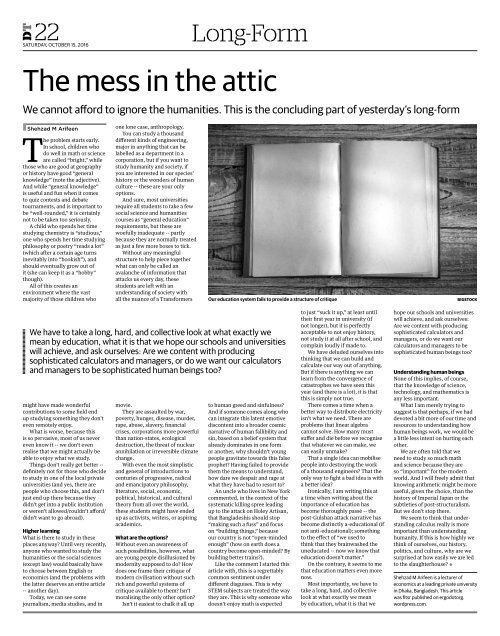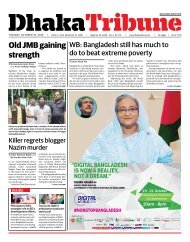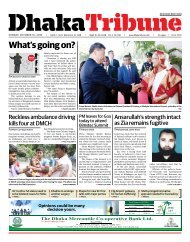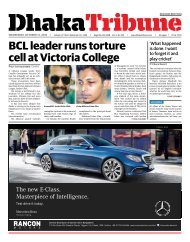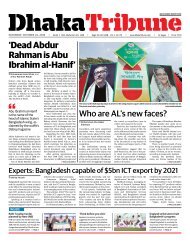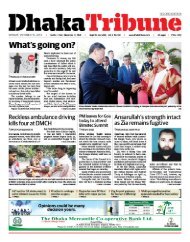DT e-Paper, Saturday, October 15, 2016
Create successful ePaper yourself
Turn your PDF publications into a flip-book with our unique Google optimized e-Paper software.
22<br />
SATURDAY, OCTOBER <strong>15</strong>, <strong>2016</strong><br />
<strong>DT</strong><br />
Long-Form<br />
The mess in the attic<br />
We cannot afford to ignore the humanities. This is the concluding part of yesterday’s long-form<br />
• Shehzad M Arifeen<br />
The problem starts early.<br />
In school, children who<br />
do well in math or science<br />
are called “bright,” while<br />
those who are good at geography<br />
or history have good “general<br />
knowledge” (note the adjective).<br />
And while “general knowledge”<br />
is useful and fun when it comes<br />
to quiz contests and debate<br />
tournaments, and is important to<br />
be “well-rounded,” it is certainly<br />
not to be taken too seriously.<br />
A child who spends her time<br />
studying chemistry is “studious,”<br />
one who spends her time studying<br />
philosophy or poetry “reads a lot”<br />
(which after a certain age turns<br />
inevitably into “bookish”), and<br />
should eventually grow out of<br />
it (she can keep it as a “hobby”<br />
though).<br />
All of this creates an<br />
environment where the vast<br />
majority of those children who<br />
one lone case, anthropology.<br />
You can study a thousand<br />
different kinds of engineering,<br />
major in anything that can be<br />
labelled as a department in a<br />
corporation, but if you want to<br />
study humanity and society, if<br />
you are interested in our species’<br />
history or the wonders of human<br />
culture -- these are your only<br />
options.<br />
And sure, most universities<br />
require all students to take a few<br />
social science and humanities<br />
courses as “general education”<br />
requirements, but these are<br />
woefully inadequate -- partly<br />
because they are normally treated<br />
as just a few more boxes to tick.<br />
Without any meaningful<br />
structure to help piece together<br />
what can only be called an<br />
avalanche of information that<br />
attacks us every day, these<br />
students are left with an<br />
understanding of society with<br />
all the nuance of a Transformers<br />
Our education system fails to provide a structure of critique<br />
BIGSTOCK<br />
We have to take a long, hard, and collective look at what exactly we<br />
mean by education, what it is that we hope our schools and universities<br />
will achieve, and ask ourselves: Are we content with producing<br />
sophisticated calculators and managers, or do we want our calculators<br />
and managers to be sophisticated human beings too?<br />
might have made wonderful<br />
contributions to some field end<br />
up studying something they don’t<br />
even remotely enjoy.<br />
What is worse, because this<br />
is so pervasive, most of us never<br />
even know it -- we don’t even<br />
realise that we might actually be<br />
able to enjoy what we study.<br />
Things don’t really get better --<br />
definitely not for those who decide<br />
to study in one of the local private<br />
universities (and yes, there are<br />
people who choose this, and don’t<br />
just end up there because they<br />
didn’t get into a public institution<br />
or weren’t allowed/couldn’t afford/<br />
didn’t want to go abroad).<br />
Higher learning<br />
What is there to study in these<br />
places anyway? Until very recently,<br />
anyone who wanted to study the<br />
humanities or the social sciences<br />
(except law) would basically have<br />
to choose between English or<br />
economics (and the problems with<br />
the latter deserves an entire article<br />
-- another day).<br />
Today, we can see some<br />
journalism, media studies, and in<br />
movie.<br />
They are assaulted by war,<br />
poverty, hunger, disease, murder,<br />
rape, abuse, slavery, financial<br />
crises, corporations more powerful<br />
than nation-states, ecological<br />
destruction, the threat of nuclear<br />
annihilation or irreversible climate<br />
change.<br />
With even the most simplistic<br />
and general of introductions to<br />
centuries of progressive, radical<br />
and emancipatory philosophy,<br />
literature, social, economic,<br />
political, historical, and cultural<br />
theory from all over the world,<br />
these students might have ended<br />
up as activists, writers, or aspiring<br />
academics.<br />
What are the options?<br />
Without even an awareness of<br />
such possibilities, however, what<br />
are young people disillusioned by<br />
modernity supposed to do? How<br />
does one frame their critique of<br />
modern civilisation without such<br />
rich and powerful systems of<br />
critique available to them? Isn’t<br />
moralising the only other option?<br />
Isn’t it easiest to chalk it all up<br />
to human greed and sinfulness?<br />
And if someone comes along who<br />
can integrate this latent emotive<br />
discontent into a broader cosmic<br />
narrative of human fallibility and<br />
sin, based on a belief system that<br />
already dominates in one form<br />
or another, why shouldn’t young<br />
people gravitate towards this false<br />
prophet? Having failed to provide<br />
them the means to understand,<br />
how dare we despair and rage at<br />
what they have had to resort to?<br />
An uncle who lives in New York<br />
commented, in the context of the<br />
systematic killing spree leading<br />
up to the attack on Holey Artisan,<br />
that Bangladeshis should stop<br />
“making such a fuss” and focus<br />
on “building things,” because<br />
our country is not “open-minded<br />
enough” (how on earth does a<br />
country become open-minded? By<br />
building better trains?).<br />
Like the comment I started this<br />
article with, this is a regrettably<br />
common sentiment under<br />
different disguises. This is why<br />
STEM subjects are treated the way<br />
they are. This is why someone who<br />
doesn’t enjoy math is expected<br />
to just “suck it up,” at least until<br />
their first year in university (if<br />
not longer), but it is perfectly<br />
acceptable to not enjoy history,<br />
not study it at all after school, and<br />
complain loudly if made to.<br />
We have deluded ourselves into<br />
thinking that we can build and<br />
calculate our way out of anything.<br />
But if there is anything we can<br />
learn from the convergence of<br />
catastrophes we have seen this<br />
year (and there is a lot), it is that<br />
this is simply not true.<br />
There comes a time when a<br />
better way to distribute electricity<br />
isn’t what we need. There are<br />
problems that linear algebra<br />
cannot solve. How many must<br />
suffer and die before we recognise<br />
that whatever we can make, we<br />
can easily unmake?<br />
That a single idea can mobilise<br />
people into destroying the work<br />
of a thousand engineers? That the<br />
only way to fight a bad idea is with<br />
a better idea?<br />
Ironically, I am writing this at<br />
a time when writing about the<br />
importance of education has<br />
become thoroughly passé -- the<br />
post-Gulshan attack narrative has<br />
become distinctly a-educational (if<br />
not anti-educational); something<br />
to the effect of “we used to<br />
think that they brainwashed the<br />
uneducated -- now we know that<br />
education doesn’t matter.”<br />
On the contrary, it seems to me<br />
that education matters even more<br />
now.<br />
Most importantly, we have to<br />
take a long, hard, and collective<br />
look at what exactly we mean<br />
by education, what it is that we<br />
hope our schools and universities<br />
will achieve, and ask ourselves:<br />
Are we content with producing<br />
sophisticated calculators and<br />
managers, or do we want our<br />
calculators and managers to be<br />
sophisticated human beings too?<br />
Understanding human beings<br />
None of this implies, of course,<br />
that the knowledge of science,<br />
technology, and mathematics is<br />
any less important.<br />
What I am merely trying to<br />
suggest is that perhaps, if we had<br />
devoted a bit more of our time and<br />
resources to understanding how<br />
human beings work, we would be<br />
a little less intent on hurting each<br />
other.<br />
We are often told that we<br />
need to study so much math<br />
and science because they are<br />
so “important” for the modern<br />
world. And I will freely admit that<br />
knowing arithmetic might be more<br />
useful, given the choice, than the<br />
history of Imperial Japan or the<br />
subtleties of post-structuralism.<br />
But we don’t stop there.<br />
We seem to think that understanding<br />
calculus really is more<br />
important than understanding<br />
humanity. If this is how highly we<br />
think of ourselves, our history,<br />
politics, and culture, why are we<br />
surprised at how easily we are led<br />
to the slaughterhouse? •<br />
Shehzad M Arifeen is a lecturer of<br />
economics at a leading private university<br />
in Dhaka, Bangladesh. This article<br />
was fitsr published on ergodotorg.<br />
wordpress.com.


